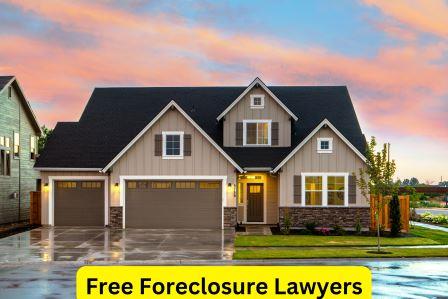Free foreclosure lawyers provide essential legal assistance to homeowners facing the threat of losing their homes due to financial difficulties. These professionals offer their services at no cost, helping clients understand their rights and options during the foreclosure process. This guide explores alternative legal options for those unable to hire a foreclosure attorney, including self-representation, consultations, legal aid organizations, and volunteer attorney programs.
What to Do if You Can’t Afford a Foreclosure Attorney
Foreclosure can be overwhelming, especially if you’re financially strapped. However, several strategies can help you protect your home without the burden of expensive legal fees.
Self-Representation
Some homeowners choose to handle their foreclosure cases without a lawyer. While this option requires a solid understanding of the legal process, it can save money on attorney fees. Homeowners should familiarize themselves with state foreclosure laws, communicate directly with lenders, and explore options like loan modifications or forbearance. It’s important to carefully consider this route, as the complexity of foreclosure cases may make legal representation beneficial.
Legal Consultation
If full representation is not financially feasible, consulting with a lawyer can still provide valuable guidance. Many attorneys offer free or low-cost consultations where you can discuss your case, gain insight into your legal standing, and receive advice on next steps. This consultation may also help connect you to other free or affordable legal resources.
Legal Aid Offices
Legal aid organizations offer free or low-cost legal assistance to those who qualify, often focusing on foreclosure and housing-related issues. Attorneys at these offices can provide personalized guidance, file necessary paperwork, or even represent you in court. These services are designed to assist low-income individuals who may not otherwise have access to legal support.
Volunteer Attorney Programs
Volunteer attorney programs connect homeowners facing foreclosure with lawyers offering pro bono services. These programs, often run by local bar associations, match clients with attorneys who volunteer their time and expertise. This is an excellent option for those in need of legal support but without the means to pay for it.
Understanding Foreclosure and Your Legal Options
Foreclosure occurs when a borrower defaults on their mortgage payments, allowing the lender to take possession of the property. This can be a stressful and complex process, especially for those already facing financial hardship. However, it’s important to know that there are legal resources available to help you fight foreclosure or negotiate alternatives, even if you cannot afford a traditional attorney.
Managing Foreclosure Without an Attorney
While hiring a lawyer is ideal, some homeowners opt to handle foreclosure independently. Here’s how you can manage the process:
- Educate Yourself on Foreclosure Laws: Research your state’s specific foreclosure regulations to understand your rights and the process timeline.
- Negotiate With Your Lender: Contact your mortgage provider as soon as you encounter difficulties making payments. Lenders may be open to loan modifications, repayment plans, or forbearance.
- Document Everything: Keep meticulous records of all communications with your lender and any documents related to your mortgage.
- Consider Alternatives to Foreclosure: Options like short sales or deeds-in-lieu of foreclosure may help you avoid the formal foreclosure process.
Seeking Legal Advice
Even if you’re handling foreclosure on your own, a brief consultation with a lawyer can offer critical insight into your case. Here’s how a consultation can help:
- Understanding Your Rights: A lawyer can explain foreclosure laws and help you determine if you have any defenses.
- Formulating a Strategy: After evaluating your situation, an attorney can provide a strategic plan to tackle the foreclosure process based on your unique financial circumstances.
Legal Aid and Volunteer Programs
For those unable to afford legal representation, legal aid organizations and volunteer attorney programs can offer free or low-cost assistance:
- Eligibility for Legal Aid: Legal aid organizations typically provide services based on income criteria. These offices can assist with paperwork, offer legal advice, and provide representation in court.
- Volunteer Lawyers: Pro bono attorneys, often associated with volunteer programs, offer free legal services to those who qualify, helping homeowners navigate the foreclosure process without incurring legal costs.
Case Study: A Real-Life Example
John and Sarah, a couple struggling with mortgage payments, faced the possibility of foreclosure. With no funds to hire an attorney, they reached out to a legal aid office, where they were connected with a lawyer who helped them negotiate a loan modification. Thanks to the attorney’s assistance, they successfully avoided foreclosure and kept their home.
Read Also- Lockhart Morris & Montgomery: Pay for Delete Credit Report
Let’s Summarize…
Facing foreclosure can be a challenging experience, but resources like free foreclosure lawyers, legal aid offices, and pro bono services offer critical support for homeowners in financial distress. While self-representation is possible, consulting with legal professionals is often the safest way to ensure your rights are protected. Explore these resources to navigate your foreclosure case effectively.
FAQs
- What is the foreclosure hotline in Washington state?
The Washington State Department of Financial Institutions provides assistance through their hotline at 1-877-894-HOME (4663). - How can I stop a foreclosure in California?
Contact your lender to discuss loan modification options or explore the possibility of filing for bankruptcy. - What do you call a lawyer who works for free?
A “pro bono” lawyer offers free legal services. - Does Florida offer free lawyers?
Yes, free legal services are available through various legal aid organizations and pro bono programs for eligible individuals.

2 thoughts on “Free Foreclosure Lawyers: A Guide to Navigating Financial Hardship”